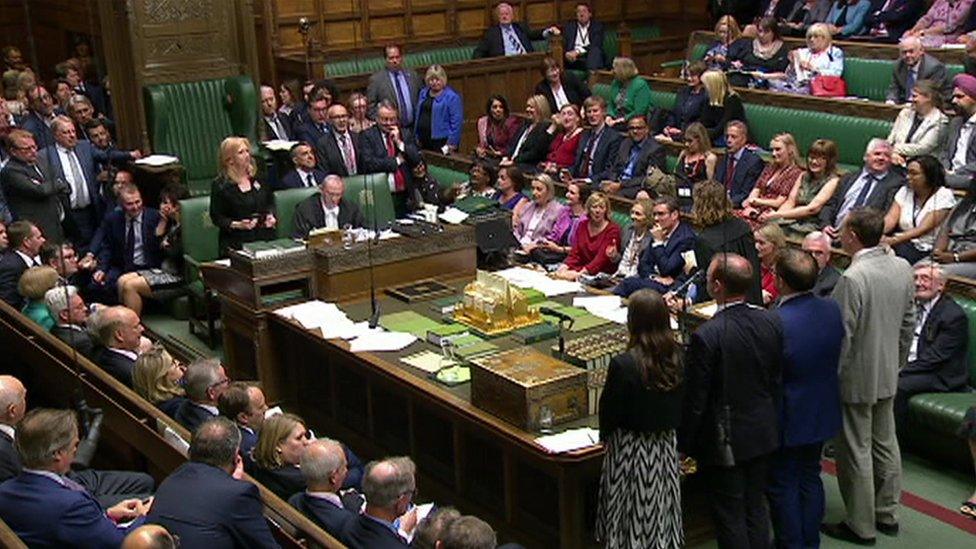Votes emphasise government's precarious position
- Published

Oh dear, what can the matter be?
Amidst stories of a whip getting stuck in the Commons lavatory or one of the new proxy votes being bungled, the government was defeated by a single vote on Tuesday night.
It was on a Dominic Grieve amendment that is supposed to make it harder for Parliament to be suspended ("prorogued" in the jargon of Westminster) to prevent MPs from blocking a no-deal Brexit.
The amendment in question requires ministers to give fortnightly statements on attempts to re-start devolved government in Northern Ireland, and the aim was to ensure that Parliament would have to be there in order to hear them - and thus would also be in a position to act, if a no-deal exit from the EU seemed likely.
The government is not so sure - suggesting that the wording could be interpreted as requiring a written statement, rather than one in the Commons.
We shall see, but having lost that one, the government then went on to defeat two further Grieve amendments...
So a new, if not insurmountable, obstacle has been placed in the way of ministers who might want to send MPs and peers home, while they pursued a no-deal exit.
But Tuesday's action underlines how precarious the government's position now is. A one-vote defeat is still a defeat; a three vote victory is still a victory - but it is also a danger sign.
The scale of this week's Tory rebellions was relatively modest, with the hard core of usual suspects breaking ranks, but can they expect reinforcements?
What does proroguing Parliament mean?
One point to keep in mind is that there have been bigger rebellions in the past, but some of the more timorous rebels may only be prepared to break cover when a full scale Brexit crisis is upon them.
Another is that quite a number of very senior ministers may soon be out of office and ready to rebel themselves.
The Chancellor, Philip Hammond said as much last week, in what was probably his final Treasury questions session.
While talk of 30 ex-ministers may be inflated, it doesn't need 30 rebels to defeat the government….. seven were enough on one occasion on Tuesday.
This is why the appointments to the whips office will be a key decision for the new PM.
So far the group of rebels around Dominic Grieve have gone pretty well unpunished. Will a new chief whip (Chris Heaton-Harris? Jake Berry?) decide to replace kid gloves with a mailed fist?
Withdrawing the whip from his Maastrict rebels didn't work out so well for John Major's government, but the current approach has not reined them in either.
Maybe a more productive approach is to reach out to disaffected and Brexity Labour MPs, and some of the current Parliament's unusually large crop of independent MPs.
I suspect the real crisis point will come when the next prime minister's Brexit policy crystallises, perhaps in September.
Inevitably it will not be possible to please all the Tory factions - a hint of postponement of Brexit Day will enrage the Brexiteers, and the Brexit Party will be poised to cry "betrayal".
Meanwhile at the other end of the Conservative Party, a commitment to no deal could see the standard of rebellion hoisted by those remain-minded ex-ministers.
This last possibility should not be under-rated.
Just watch Foreign Office Minister Alan Duncan's broadsides against the leadership front-runner, Boris Johnson - there are ministers out there who have no expectation of office in the next government, and are probably contemplating life after Westminster, too.
Deselection, where is thy sting? Or Leave.EU thy victory?
If they're not worried about a political future, they can act with complete freedom. And my impression is that they will.
And never underestimate sheer accident - 10 MPs stuck on a broken-down train, or fogbound at some airport, or struck down by a round of dodgy canapes, would be more than enough to tip the scales of this precariously-balanced House of Commons.
No-one can know whether all these factors would produce a majority for or against the government.
But with the current Speaker, it seems likely that a procedural route will be found to allow MPs to express a view - and if Parliament checkmates a prime minister intent on a no-deal exit, what then?
- Published5 November 2018

- Published6 April 2019

- Published27 October 2018

